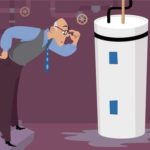It is an undeniable display of poetic injustice, isn’t it?
Here we find ourselves in the distinguished ‘Sunshine State’ of Florida, where the golden years should be spent leisurely sipping sweet tea on the veranda, not burdened by the haunting specter of insurance premiums more terrifying than any hurricane season.
The irony that the very homes intended to be secure havens from life’s tempests have transformed into anchors, dragging their cherished owners into the depths of financial despair.
Consider the case of Ellen Fincher, who has enjoyed a decade of bliss within her tranquil sanctuary in Vero Beach. Each morning, she once awakened to the gentle whispers of the ocean breeze, but now, those whispers have been replaced by the chilling gusts of impending doom.
Can you fathom the audacity of demanding $13,000 for peace of mind?
It might as well be a ransom note for the fading American Dream.
As fixed incomes clash with soaring premiums, it is the homeowners who suffer the most.
Each morning, as they pack their belongings with a heavy heart, they are confronted with a bittersweet exercise in reminiscence and regret.

In the present day, the average Floridian homeowner is compelled to shell out a staggering $6,000 simply to secure a roof that will not transform into an indoor swimming pool when hurricane season arrives.
There has been a significant 42% increase since last year. It raises the question: what could be the cause of this substantial surge?
Are Insurance Agents to Blame?
Insurance agents are often the face of insurance companies, so it’s easy to associate them with high and rising costs. However, it’s crucial to understand that they don’t set the prices – they’re mediators between the insurance companies and policyholders. Here’s why insurance agents aren’t to blame for the high and rising costs of home insurance in Florida:
- Reinsurance Costs: Reinsurance is insurance that insurance companies buy to protect themselves from significant losses. The cost of reinsurance has been climbing, which in turn affects the premiums charged to customers.
- Litigation Costs: Insurance companies often have to deal with lawsuits, and the costs associated with litigation can be substantial. These costs are typically passed on to policyholders in the form of higher premiums.
- Busy Roadways: The more traffic there is on the roads, the higher the likelihood of accidents. Florida’s busy roadways contribute to an increased number of auto insurance claims, leading insurers to raise premiums to cover these costs.
- Weather-Related Damage: Florida is particularly susceptible to weather-related damage from events like hurricanes. These disasters can lead to significant property damage claims, prompting insurance companies to increase premiums.
- Exodus of Insurers: Skyrocketing costs and an ongoing insurance crisis have led many major insurers, including Farmers, to leave the state. This decrease in competition could be contributing to the rise in insurance rates.
It’s worth noting that homeowners in Florida are paying annual premiums that are about four times higher than the national average.
Similarly, auto insurance rates have increased nationally by 17% since last summer, but the increase in Florida has been particularly sharp.
The Consequences of Florida’s Rising Insurance Premiums on Retiree Livelihoods
Our elderly citizens, the respected pillars of our community, may have experienced some challenging situations in this unfortunate series of events.
Let’s consider the case of a guy named Richard from Palm Beach County.
After a difficult three-year process for his roof claim, he now faces a significant $7,000 premium for his share of the American dream, along with a $5,000 out-of-pocket expense to fix a leak.
These are choices that no one should have to make.
It’s disheartening to see our seniors, who contribute so much to our state’s heritage, facing financial burdens.

The inflated insurance costs in Florida are significantly affecting the daily lives and financial security of retirees.
- Strain on Finances: The average cost of homeowners insurance in Florida has risen to $3,600, and some residents are paying an average premium of $4,218. This is significantly higher than the U.S. average of $2,777. These escalating costs are putting a strain on the finances of retirees who often live on a fixed income.
- Risk of Losing Homes: The soaring insurance premiums are causing concerns among seniors that they might lose their homes. Some insurers are dropping policyholders and increasing rates, causing financial distress for retirees.
- Increased Cost of Living: The rising insurance costs contribute to an overall increase in the cost of living in Florida. This impacts all aspects of retirees’ lives, from housing and healthcare to utilities and leisure.
- Driving Residents Away: The allure of sunshine, low taxes, and low housing prices have been attracting people to Florida for decades, but high insurance premiums are beginning to drive homeowners away. This is particularly concerning for retirees who have chosen Florida as their retirement destination.
- Impact on Retirement Decisions: The inflated insurance costs are one reason why Florida is no longer the number one state for retirees. The high costs can deter potential retirees from moving to Florida or prompt current residents to consider other states with lower insurance rates.
Relief Options for Homeowners Facing High Insurance Costs
Amidst the reality of rising insurance premiums, it becomes essential to explore potential relief options that can help mitigate the financial burden on Florida’s retirees. Various strategies could provide respite and create a more sustainable cost structure for insurance.
- Mortgage Assistance & Relief Programs: These programs can help lower your monthly mortgage payment or provide other forms of homeowner relief.
- Homeowner Assistance Fund (HAF): Authorized by the American Rescue Plan Act, HAF provides $9.961 billion to support homeowners facing financial hardship. HAF programs distribute assistance to eligible homeowners to cover qualified expenses related to mortgages and housing.
- Risk Mitigation Measures: Homeowners can implement measures to mitigate risks, such as installing hurricane shutters or reinforced roofs, which could potentially lower their insurance premiums.
- State Assistance Programs: Some states offer assistance programs for homeowners struggling with high insurance costs. These programs vary from state to state and may provide direct financial assistance or resources to help homeowners find more affordable coverage.
While these options can provide some relief, it’s important for homeowners to thoroughly research each program and consider their individual circumstances before making a decision.
Navigating Through Florida’s Insurance Turmoil: Measures and Irony
There are indeed legislative actions being taken to address the excessive litigation and insurance company exodus contributing to the ongoing insurance crisis in Florida.
- Major Property Insurance Legislation: The Florida Legislature and Governor have passed major property insurance legislation in 2021 and 2022 to tackle this issue.
- Florida’s Troubled Property Insurance Litigation Reform: In response to the troubled property insurance litigation environment, Florida enacted a substantial reform package in December.
- Tort Reforms: A wide range of tort reform laws (HB 837) were approved by the Florida House and went into effect on March 24. These reforms are expected to have a significant impact on insurance litigation in Florida.
- Legislation on Attorney Fees: As insurers continue to leave Florida, Governor Ron DeSantis signed legislation addressing attorney fees associated with insurance litigation.
- Insurance Regulation Changes: Changes in Florida’s insurance regulation aim to prevent the rampant excess cost insurers incur to defend against baseless bad-faith claims.
- Elimination of One-Way Attorney Fees: Excessive litigation is being addressed by eliminating one-way attorney fees for property insurance and instead allowing both parties to obtain fees through the court system.
These measures indicate a concerted effort by the state’s government to curb excessive litigation and stem the exodus of insurance companies from the state.

Let’s enjoy another cup of that denial-flavored Kool-Aid, my fellow Floridians.
As insurance rates increase and our wallets feel the pinch, we’ll raise a toast to the gaps between our lives and our livelihoods.
Here’s to another day in paradise, hoping for favorable choices even when the odds are not in our favor.








